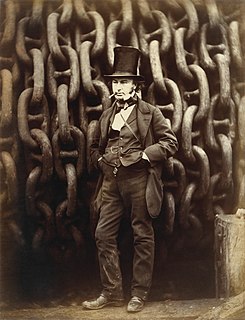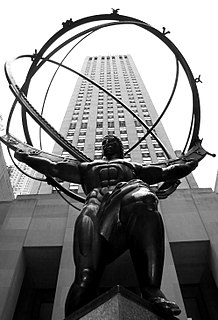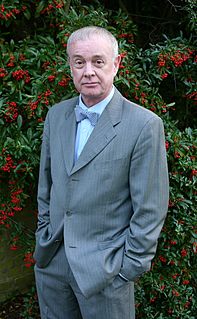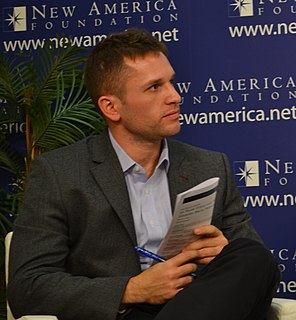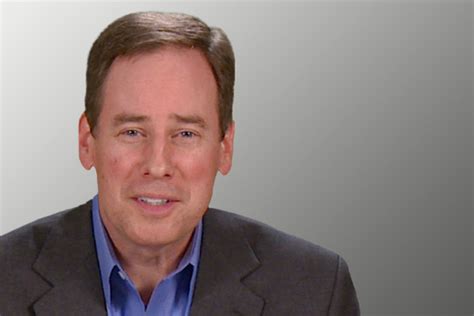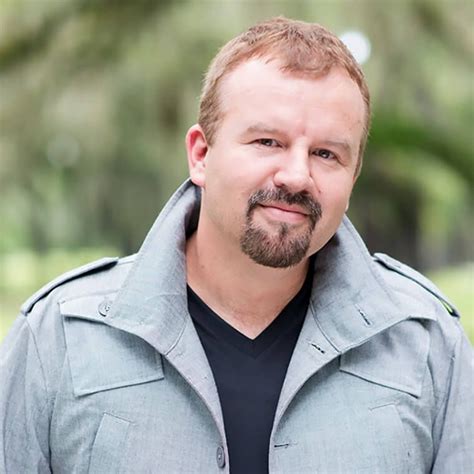Top 889 Errors Quotes & Sayings - Page 15
Explore popular Errors quotes.
Last updated on April 17, 2025.
If the Commission is to enquire into the conditions "to be observed," it is to be presumed that they will give the result of their enquiries; or, in other words, that they will lay down, or at least suggest, "rules" and "conditions to be (hereafter) observed" in the construction of bridges, or, in other words, embarrass and shackle the progress of improvement to-morrow by recording and registering as law the prejudices or errors of to-day. [Objecting to any interference by the State with the freedom of civil engineers in the conduct of their professional work.]
Continuous Integration is a software development practice where members of a team integrate their work frequently, usually each person integrates at least daily - leading to multiple integrations per day. Each integration is verified by an automated build (including test) to detect integration errors as quickly as possible. Many teams find that this approach leads to significantly reduced integration problems and allows a team to develop cohesive software more rapidly.
Our agency, given us through the plan of our Father, is the great alternative to Satan's plan of force. With this sublime gift, we can grow, improve, progress, and seek perfection. Without agency, none of us could grow and develop by learning from our mistakes and errors and those of others.... I do not really think the devil can make us do anything. Certainly he can tempt and he can deceive, but he has no authority over us that we do not give him.
God sees us with the eyes of a Father. He sees our defects, errors, and blemishes. But He also sees our value. What did Jesus know that enabled Him to do what He did? Here’s part of the answer: He knew the value of people. He knew that each human being is a treasure. And because He did, people were not a source of stress, but a source of joy.
All I can say is Bishop Jakes would not currently accept the designation of Prosperity Preacher or Word of Faith Preacher as an accurate description of what he believes currently. Now his ministry will have to bear that out. I'm not here to defend him or stick up for his various errors. And I don't want to minimize error that is significant. All I'm saying is that he, as of two weeks ago, would not accept those terms, in private conversation, as accurate descriptors of what he believes.
For the first time in history, the rational and the good are fully armed in the battle against evil. Here we finally find the answer to our paradox; now we can understand the nature of the social power held by evil. Ultimately, the evil, the irrational, truly has no power. The evil men’s control of morality is transient; it lives on borrowed time made possible only by the errors of the good. In time, as more honest men grasp the truth, evil’s stranglehold will be easily broken.
There are very few errors and false doctrines of which the beginning may not be traced up to unsound views about the corruption of human nature. Wrong views of the disease will always bring with them wrong views of the remedy. Wrong views of the corruption of human nature will always carry with them wrong views of the grand antidote and cure of that corruption.
You cannot show real respect to your parents by perpetuating their errors.... Do you consider that the inventor of a steel plow cast a slur upon his father who scratched the ground with a wooden one? I do not consider that an invention by the son is a slander upon the father; I regard each invention simply as an improvement; and every father should be exceedingly proud of an ingenious son. If Mr. Talmage has a son, it will be impossible for him to honor his father except by differing with him.
There are people already sharing eBooks out there, .. and they do it simply because they love books. You don't buy a second copy of a book, cut the spine off, lay each page on a scanner, run that .tif through an OCR (Optical Character Reader), hand edit the resulting output for errors and then post it online if you don't love the book. it can up to 80 hours to turn a printed novel into an eBook. I figure if someone out there is willing to put in 80 hours of work promoting my book, then I'd prefer they do it in a way that gives a better return to me.
When we speak to drunkards, worldlings, or any ignorant, unconverted men, we disgrace them as in that condition to the utmost, and lay it on as plainly as we can speak, and tell them of their sin, and shame, and misery: and we expect, not only that they should bear all patiently, but take all thankfully, and we have good reasons for all this; and most that I deal with do take it patiently... But if we speak to a godly minister against his errors or any sin... if it be not more an applause than a reprehension, they take it as an injury almost insufferable.
There must be no barriers to freedom of inquiry... There is no place for dogma in science. The scientist is free, and must be free to ask any question, to doubt any assertion, to seek for any evidence, to correct any errors. Our political life is also predicated on openness. We know that the only way to avoid error is to detect it and that the only way to detect it is to be free to inquire. And we know that as long as men are free to ask what they must, free to say what they think, free to think what they will, freedom can never be lost, and science can never regress.
There ain't no genius here. Strategy in baseball is overrated. People say, 'That Weaver, he plays for the long ball too much.' You bet I do. Hit 'em out. Then I got no worry about somebody lousing up a bunt, I got no worry about the hit and run - and that's really overrated - I got no worry about base-running errors. And I can't screw it up myself.
One of the things that sets the Bible apart from all other ancient religious writings is its scientific accuracy. Without exception, every other ancient religious writing contains certain scientific errors. For example, Muhammad taught in the Qur'an that the sun descends down into a muddy spring. The Hindu Vedas state that the Earth is flat and triangular, that earthquakes are caused by elephants shaking themselves under it. You'll never read absurd statements like those in the Bible.
Mood evidently affects the operation of System 1: when we are uncomfortable and unhappy, we lose touch with our intuition. These findings add to the growing evidence that good mood, intuition, creativity, gullibility, and increased reliance on System 1 form a cluster. At the other pole, sadness, vigilance, suspicion, an analytic approach, and increased effort also go together. A happy mood loosens the control of System 2 over performance: when in a good mood, people become more intuitive and more creative but also less vigilant and more prone to logical errors.
To create guilt, all that you need is a very simple thing: start calling mistakes, errors - sins. They are simply mistakes, human. Now, if somebody commits a mistake in mathematics - two plus two, and he concludes it makes five - you don`t say he has committed a sin. He is unalert, he is not paying attention to what he is doing. He is unprepared, he has not done his homework. He is certainly committing a mistake, but a mistake is not a sin. It can be corrected. A mistake does not make him feel guilty. At the most it makes him feel foolish.
The registering of doubts hath two excellent uses: the one, that it saveth philosophy from errors and falsehoods; when that which is not fully appearing is not collected into assertion, whereby error might draw error, but reserved in doubt: the other, that the entry of doubts are as so many
suckers or sponges to draw use of knowledge; insomuch as that which, if doubts had not preceded, a man should never have advised, but passed it over without note, by the suggestion and solicitation of doubts, is made to be attended and applied.
I have been judged vehemently suspect of heresy, that is, of having held and believed that the sun in the centre of the universe and immoveable, and that the earth is not at the center of same, and that it does move. Wishing however, to remove from the minds of your Eminences and all faithful Christians this vehement suspicion reasonably conceived against me, I abjure with a sincere heart and unfeigned faith, I curse and detest the said errors and heresies, and generally all and every error, heresy, and sect contrary to the Holy Catholic Church. (Quoted in Shea and Artigas 194)
The history of science, like the history of all human ideas, is a history of irresponsible dreams, of obstinacy, and of error. But science is one of the very few human activities-perhaps the only one-in which errors are systematically criticized and fairly often, in time, corrected. This is why we can say that, in science, we often learn from our mistakes, and why we can speak clearly and sensibly about making progress there. In most other fields of human endeavour there is change, but rarely progress ... And in most fields we do not even know how to evaluate change.
All errors are just ordinary, what extraordinary sin can you commit? All the sins have been committed already. You cannot find a new sin - it is very difficult, it is almost impossible to be original about sin. For millions of years people have committed everything that can be committed. To be thrown in hell for your sins. Now this is too much! you can throw a man into hell for five years, ten years, twenty years, fifty years. If a man has lived for seventy years you can throw him there for seventy years.and that is if you only believe in one life. It is good that they believe in one life.
The girl had a certain nobleness of imagination, which rendered her a good many services and played her a great many tricks. She spent half her time in thinking of beauty, bravery, magnanimity; she had a fixed determination to regard the world as a place of brightness, of free expansion, of irresistible action, she thought it would be detestable to be afraid or ashamed. She had an infinite hope that she would never do anything wrong. She had resented so strongly, after discovering them, her mere errors of feeling.
I pray that each one of us stays awake as we fall. I pray that we choose to go into the abyss willingly and that our fall is cushioned by faith--faith that at the bottom we will be caught and taught and turned toward the light. I pray that we don't waste precious energy feeling ashamed of our mistakes, or embarrassed by our flaws. After years of teaching, I know only a few things for sure. One of them is this: We are chunks of dense matter that need to be cracked open. Our errors and failings are chinks in the heart's armor through which our true colors can shine.
Young men, in the conduct and manage of actions, embrace more than they can hold; stir more than they can quiet; fly to the end, without consideration of the means and degrees; pursue some few principles, which they have chanced upon absurdly; care not to innovate, which draws unknown inconveniences; use extreme remedies at first; and, that which doubleth all errors, will not acknowledge or retract them; like an unready horse, that will neither stop nor turn.
My experiences of men has neither disposed me to think worse of them nor be indisposed to serve them: nor, in spite of failures which I lament, of errors which I now see and acknowledge, or the present aspect of affairs, do I despair of the future. The truth is this: The march of Providence is so slow and our desires so impatient; the work of progress so immense and our means of aiding it so feeble; the life of humanity is so long, that of the individual so brief, that we often see only the ebb of the advancing wave and are thus discouraged. It is history that teaches us to hope.
More investment sins are probably committed by otherwise quite intelligent people because of "tax considerations" than from any other cause. One of my friends-a noted West Coast philosopher-maintains that a majority of life's errors are caused by forgetting what one is really trying to do. This is certainly the case when an emotionally supercharged element like taxes enters the picture (I have another friend-a noted East Coast philosopher who says it isn't the lack of representation he minds-it's the taxation).
In vain do we seek tranquility in the desert; temptations are always with us; our passions, represented by the demons, never let us alone: those monsters created by the heart, those illusions produced by the mind, those vain specters that are our errors and our lies always appear before us to seduce us; they attack us even in our fasting or our mortifications, in other words, in our very strength.
The errors of a wise man are literally more instructive than the truths of a fool. The wise man travels in lofty, far-seeing regions; the fool in low-lying, high-fenced lanes; retracing the footsteps of the former, to discover where he diviated, whole provinces of the universe are laid open to us; in the path of the latter, granting even that he has not deviated at all, little is laid open to us but two wheel-ruts and two hedges.
Children are our crop, our fields, our earth. They are birds let loose into darkness. They are errors renewed. Still, they are the only source from which may be drawn a life more successful, more knowing than our own. Somehow they will do one thing, take one step further, they will see the summit. We believe in it, the radiance that streams from the future, from days we will not see. Children must live, must triumph. Children must die; that is an idea we cannot accept.
Remember, how often the great art of the past didn't look great at first, how often it didn't look like art at all; how much easier it is, decades or centuries later, to adore it, not only because it is, in fact, great but because it's still here; because the inevitable little errors and infelicities tend to recede in an object that's survived the War of 1812, the eruption of Krakatoa, the rise and fall of Nazism.
Mathematical analysis is as extensive as nature itself; it defines all perceptible relations, measures times, spaces, forces, temperatures:;; this difficult science is formed slowly, but it preserves every principle which it has once acquired; it grows and strengthens itself incessantly in the midst of the many variations and errors of the human mind. It's chief attribute is clearness; it has no marks to express confused notations. It brings together phenomena the most diverse, and discovers the hidden analogies which unite them.
People often find it easier to refute a fake extreme opponent than a more cautious real one, so they knock down the straw man instead. It is actually worth the trouble to identify the invalid forms of argument, and to learn their names. Not only can you then avoid them yourself; you can also identify them in opponents. If you call your opponent's errors by their Latin names, you can make it look as though he or she is suffering from a rare tropical disease.
But all the while, there was one thing we most needed even from the start, and certainly will need from here on out into the New Jerusalem: the ability to take our freedom seriously and act on it, to live not in fear of mistakes but in the knowledge that no mistake can hold a candle to the love that draws us home. My repentance, accordingly, is not so much for my failings but for the two-bit attitude toward them by which I made them more sovereign than grace. Grace - the imperative to hear the music, not just listen for errors - makes all infirmities occasions of glory.
Love never dies a natural death. It dies because we don't know how to replenish its source. It dies of blindness and errors and betrayals. It dies of illness and wounds; it dies of weariness, of witherings, of tarnishings. Anaïs Nin I like not only to be loved, but also to be told I am loved. George Eliot Love is the voice under all silences, the hope which has no opposite in fear; the strength so strong mere force is feebleness: the truth more first than sun, more last than star.
All you need is already within you, only you must approach your self with reverence and love. Self-condemnation and self-distrust are grievous errors. Your constant flight from pain and search for pleasure is a sign of love you bear for your self, all I plead with you is this: make love of your self perfect. Deny yourself nothing -- glue your self infinity and eternity and discover that you do not need them; you are beyond.
In the one-on-one it is going to be harder for [Donald] Trump to get away from those sorts of things because there will be more opportunities for Hillary [Clinton] to follow up on those sorts of things. And I also think to your previous point, I think she really does need to induce errors from him because the biggest hazard to Hillary Clinton is that Trump could clear the low bar of acceptability in debate.
If the errors of my life have profited me one great truth it is this: believe. Believe in your destiny and the star from which it shines. Believe you have been sent from God as an arrow pulled from his own bow. It is the single universal trait which the great of this earth have all shared, while the shadows are fraught with ghosts who roam the winds with mournful wails of regret on their lips. Believe as if your life depended upon it, for indeed it does.
Our policy is to give all possible material aid to the nations that still resist aggression across the Atlantic and Pacific Oceans. And we make it abundantly clear that we intend to commit none of the fatal errors of appeasement. We have the thought that in this nation of many states we have found the way in which men of many racial origins may live together in peace. If the human race as a whole is to survive, the world must find a way by which men and nations may live together in peace. We cannot accept the doctrine that war must be forever a part of man's destiny.
If nature be regarded as the teacher and we poor human beings as her pupils, the human race presents a very curious picture. We all sit together at a lecture and possess the necessary principles for understanding it, yet we always pay more attention to the chatter of our fellow students than to the lecturer's discourse. Or, if our neighbor copies something down, we sneak it from him, stealing what he himself may have heard imperfectly, and add it to our own errors of spelling and opinion.
Testing by itself does not improve software quality. Test results are an indicator of quality, but in and of themselves, they don't improve it. Trying to improve software quality by increasing the amount of testing is like trying to lose weight by weighing yourself more often. What you eat before you step onto the scale determines how much you will weigh, and the software development techniques you use determine how many errors testing will find. If you want to lose weight, don't buy a new scale; change your diet. If you want to improve your software, don't test more; develop better.
Perhaps the history of the errors of mankind, all things considered, is more valuable and interesting than that of their discoveries. Truth is uniform and narrow; it constantly exists, and does not seem to require so much an active energy, as a passive aptitude of the soul in order to encounter it. But error is endlessly diversified; it has no reality, but is the pure and simple creation of the mind that invents it. In this field the soul has room enough to expand herself, to display all her boundless faculties, and all her beautiful and interesting extravagancies and absurdities.
The significance of our lives and our fragile planet is then determined only by our own wisdom and courage. We are the custodians of life's meaning. We long for a Parent to care for us, to forgive us our errors, to save us from our childish mistakes. But knowledge is preferable to ignorance. Better by far to embrace the hard truth than a reassuring fable. If we crave some cosmic purpose, then let us find ourselves a worthy goal.
Most people like to believe something is or is not true. Great scientists tolerate ambiguity very well. They believe the theory enough to go ahead; they doubt it enough to notice the errors and faults so they can step forward and create the new replacement theory. If you believe too much you'll never notice the flaws; if you doubt too much you won't get started. It requires a lovely balance.
If the DHS insists, as bureaucracies are apt to do, that open-source must be certified via a sanctioned, formal process, it will interfere with the informal process of open-source itself. It seems to me the DHS is trying to turn an open-source development project into a Microsoft (or IBM or Oracle) software development project. And we know what that means: more, not fewer, errors -- security and otherwise.
The ruin of a man's teaching comes of his followers, such as having never touched the foundation he has laid, build upon it wood, hay, and stubble, fit only to be burnt. Therefore, if only to avoid his worst foes, his admirers, a man should avoid system. The more correct a system the worse will it be misunderstood; its professed admirers will take both its errors and their misconceptions of its truths, and hold them forth as its essence.
Trusting people to be creative and constructive when given more freedom does not imply an overly optimistic belief in the perfectibility of human nature. It is, rather, belief that the inevitable errors and sins of the human condition are far better overcome by individuals working together in an environment of trust and freedom and mutual respect than by individuals working under a multitude of rules, regulations, and restraints imposed upon them by another group of imperfect individuals.
Even in an advanced stage of civilization, there is always a tendency to prefer those parts of literature which favor ancient prejudices, rather than those which oppose them; and in cases where this tendency is very strong, the only effect of great learning will be to supply the materials which may corroborate old errors and confirm old superstitions. In our time such instances are not uncommon; and we frequently meet with men whose erudition ministers to their ignorance, and who, the more they read the less they know.
Most inexperienced cooks believe, mistakenly, that a fine cake is less challenging to produce than a fine souffle or mousse. I know, however, that a good cake is like a good marriage: from the outside, it looks ordinary, sometimes unremarkable, yet cut into it, taste it, and you know that it is nothing of the sort. It is the sublime result oflong and patient experience, a confection whose success relies on a profound understanding of compatibilities and tastes; on a respect for measurement, balance, chemistry and heat; on a history of countless errors overcome.
The realm of the real is Spirit. The unlikeness of Spirit is matter, and the opposite of the real is not divine, it is a human concept. Matter is an error of statement. This error in the premise leads to errors in the conclusion in every statement into which it enters. Nothing we can say or believe regarding matter is immortal, for matter is temporal and is therefore a mortal phenomenon, a human concept, sometimes beautiful, always erroneous.
My first baseman is George "Catfish" Metkovich from our 1952 Pittsburgh Pirates team, which lost 112 games. After a terrible series against the New York Giants, in which our center fielder made three throwing errors and let two balls get through his legs, manager Billy Meyer pleaded, "Can somebody think of something to help us win a game?" "I'd like to make a suggestion," Metkovich said. "On any ball hit to center field, let's just let it roll to see if it might go foul."
